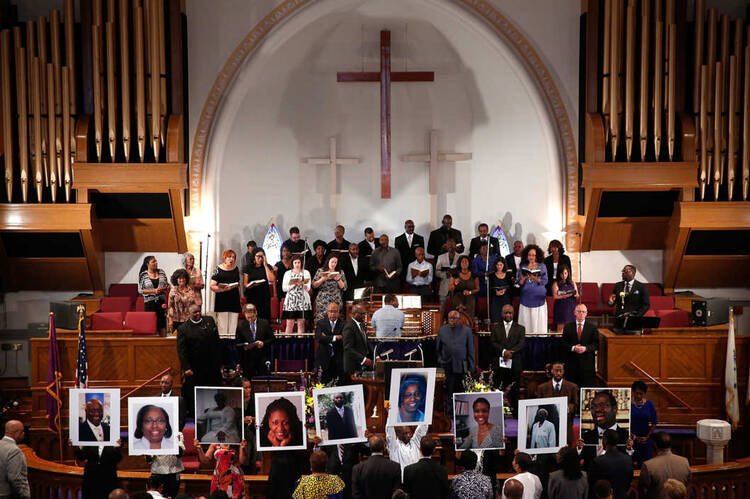It’s said to be Pope Francis’ favorite Church document. In his lifetime of ministry, his most cited. Back in 1975, in Evangelii Nuntiandi (Proclaiming the Gospel), Pope Paul VI insisted that
Pope Paul VI told the Church always to be asking herself three questions:
- In our day, what has happened to that hidden energy of the Good News, which is able to have a powerful effect on man’s conscience?
- To what extent and in what way is that evangelical force capable of really transforming the people of this century?
- What methods should be followed in order that the power of the Gospel may have its effect?
I don’t know the answer to those questions. At least not fully. They belong to the very constitution of the Church. To that extent, they can only be answered by the entire Church, by each one of us.
Here’s another question, which I can’t answer. How could a young man stay for an hour with the members of the Emanuel African Methodist Episcopal Church in Charleston, sit with them as they studied the scriptures, and then open fire on them?
He killed Tywanza Sanders, 26, who had just gotten a degree in business administration. He tried to talk the gunman out of his heinous deed, and then, in a futile attempt to save her life, dived in front of his elderly aunt, Susie Jackson. She was 87. Emmanuel had always been her church.
He killed Cynthia Hurd, 54, a librarian for 31 years. In the words of her brother, “a woman of faith.” And DePayne Middleton-Doctor, 49. She had retired from county government, and loved to sing. She had four daughters in junior high through college. Sharonda Coleman-Singleton, 45, was a speech therapist at Goose Creek High School. She coached the girls’ track and field team. Ethel Lee Lance, 70, had been a sexton at Emmanuel for three decades. Myra Thompson, 59, had come from Holy Trinity Reformed Episcopal Church, where her husband, the Rev. Anthony Thompson, serves as vicar. The Rev. Daniel Lee Simmons Sr., 74, had made a similar journey. He was a retired pastor from another parish but would regularly stop by Emanuel.
Going into the church, the gunman had asked for the pastor. That was the Rev. Clementa C. Pinckney, a tall, rangy man with a deep voice. He might well have been in Columbia, the capital. He was also a state senator, but, that night, he was with his own.
What explains the hatred of that young man? Racism? Mental Illness? Ignorance? Who can fathom iniquity? We must reject it and struggle mightily against it, but, in the end, evil is unexplainable. Sin doesn’t make sense.
They were studying Mark 4: 16-20, that night at Emanuel African Methodist Episcopal Church, about the Word of God that must fall on good soil if it is to bear fruit. That’s what it means to be a parish: to bear fruit together.
Pope Paul VI said that
At one point, the gunman asked a woman if she had been shot yet. When she said no, he said: “Good. Someone has to live to tell the story, because I’m going to kill myself, too.”
“To live to tell the story.” What maleficent irony! Because that’s what it means to be a disciple. Ask yourself. How do I share the Gospel? How to I call others into the Church? If no answer comes to mind, tremble. Shake for the salvation of your soul, because to be saved by the Gospel and to share it, are one in the same.
“I must proclaim the Good News of the kingdom of God.” Pope Paul VI said that sums up the whole mission of Jesus: “That is what I was sent to do” (§6). Saint Mark tells us, Jesus departed from there and came to his native place, "accompanied by his disciples. When the sabbath came began to teach in the synagogue, and many who heard him were astonished" (6:1-2).
In Evangelii Nuntiandi Pope Paul VI describes an evangelizing Church. Like a prophet, he sees Emanuel African Methodist Episcopal Church, across the miles and years.
What the Lord intends for you, for me, for his Church is a mystery, but pray God, at the end of our lives, the words of Ezekiel will be as true of us as they are of the nine faithful at Emanuel African Methodist Episcopal Church.
Ezekiel 2: 2-5 1 Corinthians 12: 7-10 Mark 6: 1-6








